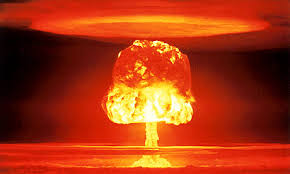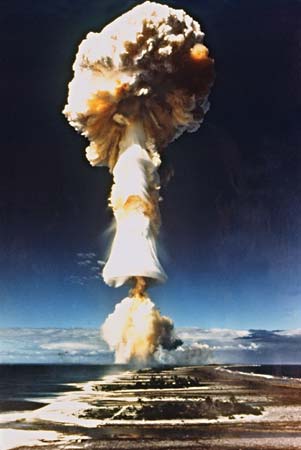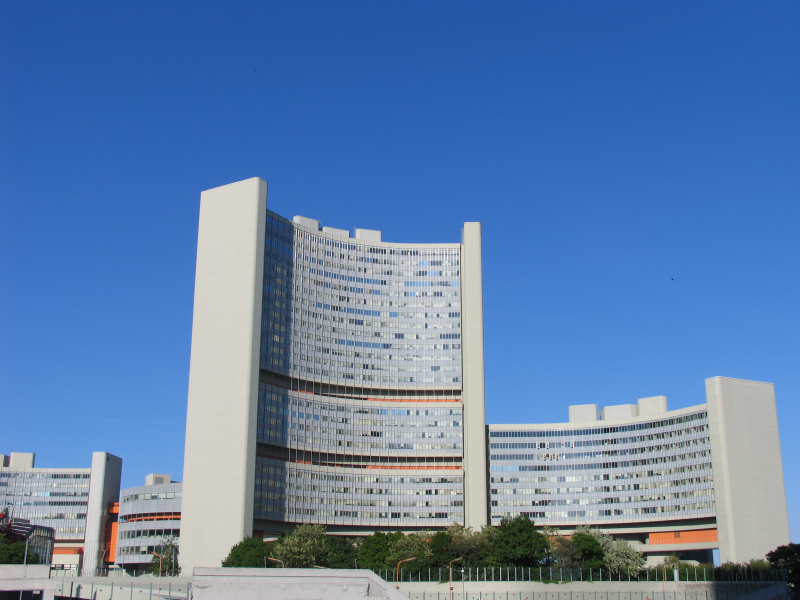On this page
These weapons cause large scale, indiscriminate death and devastation, and their existence is a constant threat to international security and our way of life.
New Zealand is party to a range of treaties and initiatives that work toward global disarmament and countering the spread of weapons of mass destruction.
Nuclear weapons

New Zealand's history of opposition to nuclear weapons dates from the UN’s formation in 1945, the same year nuclear weapons were used in Hiroshima and Nagasaki. New Zealand joined the first Resolution of the first ever General Assembly, which voted for the elimination of nuclear weapons from national armaments.
Opposition to nuclear weapons and nuclear tests gained momentum in New Zealand throughout the 1960s and 1970s, culminating in 1984 when the Government declared New Zealand ‘nuclear-free’. This was enshrined in legislation in the 1987 New Zealand Nuclear-Free Zone Disarmament and Arms Control Act.
Borne out of the lived experience of nuclear weapons testing in the Pacific, the South Pacific Nuclear Free Zone Treaty, known as the Treaty of Rarotonga, was adopted in 1985. See more information about the Treaty here(external link).
In 2017, States including New Zealand adopted the landmark Treaty on the Prohibition of Nuclear Weapons (TPNW). New Zealand became a state party to the TPNW in 2018. The TPNW’s comprehensive prohibitions on nuclear weapons complement New Zealand’s domestic nuclear-free legislation.
For more information about New Zealand’s story, see this page prepared for MFAT’s 75th anniversary: Taking a nuclear-free policy to the world.
Nuclear states
Nine countries are known or believed to have nuclear weapons. China, France, Russia, the UK, and the US are officially recognised under the Nuclear Non-Proliferation Treaty as 'nuclear weapon states'. Israel, India, Pakistan, and North Korea are not party to the treaty and are usually referred to as the ‘nuclear weapon possessor states’.
Nuclear treaties and agreements
New Zealand is a party to several international agreements and organisations that work toward disarmament and the non-proliferation of nuclear weapons. These include:
The Nuclear Non-Proliferation Treaty (NPT)
The 1970 NPT is the major global treaty that works towards a world free of nuclear weapons. Under its terms, the five recognised nuclear weapons states agreed to pursue nuclear disarmament in exchange for non-nuclear weapons states' agreement not to develop or acquire them. However, all states have the right to use nuclear energy and technology for peaceful purposes.
We continue to encourage nuclear weapon possessor states to join the treaty as non-nuclear weapon states and to place all their nuclear facilities under comprehensive International Atomic Energy Agency safeguards. New Zealand is active in the NPT nuclear disarmament context as a partner in the New Agenda Coalition along with Brazil, Egypt, Ireland, Mexico and South Africa.
More about the Nuclear Non-Proliferation Treaty(external link)
The Treaty on the Prohibition of Nuclear Weapons (TPNW)
The TPNW is the first international treaty that prohibits nuclear weapons. It recognises the disproportionate impact weapons have on women and girls, and on indigenous peoples. The TPNW contains positive obligations for States Parties on victim assistance, environmental remediation, and international assistance and cooperation. It was adopted in 2017 and entered into force in 2021. More about the TPNW.(external link)
Comprehensive Nuclear Test Ban Treaty (CTBT)

The CTBT has been signed and ratified by an overwhelming majority of countries. However, the treaty, drawn up in 1996, will only come into force when it is ratified by all 44 countries deemed nuclear-capable under the CTBT.
When it enters into force, the CTBT will ban all nuclear test detonations. To monitor this, it also establishes a comprehensive monitoring system to make sure no nuclear explosion goes undetected.
Most of the planned monitoring facilities are already operating. New Zealand runs seven of these facilities in different parts of New Zealand and the Pacific. These, and other stations, helped to confirm that North Korea tested a nuclear weapon in 2013.
Read more about the Comprehensive Nuclear Test Ban Treaty(external link)

Reflecting its slogan “Atoms for Peace”, the International Atomic Energy Agency acts as the world’s nuclear inspectorate and supports the use of nuclear technology for peaceful purposes. Established by the UN in 1957, the IAEA makes sure countries comply with their commitments under the Nuclear Non-Proliferation Treaty.
The agency also develops nuclear safety standards and promotes the peaceful use of nuclear technology, e.g. for use in healthcare and food sterilisation.
New Zealand actively participates in the work of the IAEA, particularly around the safety and security of nuclear material and ensuring that it is only used for peaceful purposes.
Read more about the International Atomic Energy Agency(external link)
Global Partnership Against Weapons of Mass Destruction
We also participate in the Global Partnership to fund the destruction of stockpiled weapons. It has funded the dismantling of weapons of mass destruction in Russia and other former Soviet states.
Read more about the Global Partnership Against Weapons of Mass Destruction(external link)
Proliferation Security Initiative
We participate in the 2003 Proliferation Security Initiative - an informal network of countries working together to prevent the trafficking of weapons of mass destruction and the materials used to make them.
Read more about the Proliferation Security Initiative(external link)
Global Initiative to Counter Nuclear Terrorism
This initiative was set up in 2006 to keep nuclear weapons out of the hands of terrorists. We are a member of this voluntary group that works to strengthen the policies and procedures of each partner country so the world is well prepared to prevent, detect and respond to a nuclear terrorist threat.
Chemical weapons
Chemical weapons are toxic chemicals used to kill or injure. When released they may choke, poison, or blister the victim, or disrupt their nervous system.
Chemical weapons have been used as a weapon of mass destruction since World War I.
Chemical weapons are of particular concern because they're considerably easier and cheaper to make than nuclear weapons, and easily within reach of most countries. The chemicals used to make these weapons have many commercial uses so they're often easy to obtain. That said, international treaties banning chemical weapons have been successful in significantly reducing the number of chemical weapons in the world.
Chemical Weapons Convention (CWC)
The Chemical Weapons Convention bans the production, stockpiling and use of chemical weapons and calls for the destruction of all existing chemical weapons. New Zealand gives effect to the CWC through the Chemical Weapons (Prohibition) Act 1996.
The convention, which entered into force in 1997, is managed and monitored by the Organisation for the Prohibition of Chemical Weapons (OPCW) based in the Hague. New Zealand engages actively in the work of the OPCW, particularly around preserving the international norm against chemical weapons use and supporting full CWC implementation, including the in Pacific. New Zealand strongly advocates for the CWC and encourages remaining countries to join.
Read more about the Chemical Weapons Convention and the OPCW(external link)
Biological weapons
Biological weapons contain disease-causing agents such as bacteria, viruses, and fungi that harm or kill people, animals, or plants. Although biological weapons haven’t been used in warfare since World War II, the relative ease with which they can be made and delivered has raised fears they may become a weapon of choice for terrorists.
Biological Weapons Convention
New Zealand is a party to the 1972 Biological Weapons Convention (BWC) that bans the stockpiling, production, and development of biological weapons. The Convention extends to weapons directed against animals and plants as well as humans. New Zealand fully supports the BWC but is concerned that, unlike the Chemical Weapons Convention (which has a comprehensive verification regime), the BWC does not have a mandatory system to verify whether its prohibitions on biological weapons are being observed.
Read more about the Biological Weapons Convention(external link)
The Australia Group
New Zealand also belongs to the Australia Group, an informal grouping of countries created in 1985 that work together to ensure their exports don’t contribute to the proliferation of chemical or biological weapons. Export controls, such as controlled goods lists and permit procedures, are coordinated between the 42 member countries plus the European Union to help ensure that material that could be used to produce weapons of mass destruction doesn’t get into the wrong hands.
More about the Australia Group(external link)
Missile Technology Control Regime (MTCR)
The key objective of the MTCR is to limit the proliferation of missiles capable of delivering weapons of mass destruction (WMD), and key technologies associated with these missiles. WMD are weapons capable of delivering nuclear, biological, and chemical payloads.
New Zealand is a longstanding and proud supporter of the disarmament and non-proliferation movement globally. Our membership of this key export control regime plays an important role in supporting international security. It also allows us to advocate for stronger non-proliferation controls for weapons capable of immense destruction and unacceptable human suffering.
Please see the MTCR website(external link) for further information on the regime and the latest news on its activities.
Export controls
New Zealand implements its MTCR commitments in accordance with our national export controls framework.

